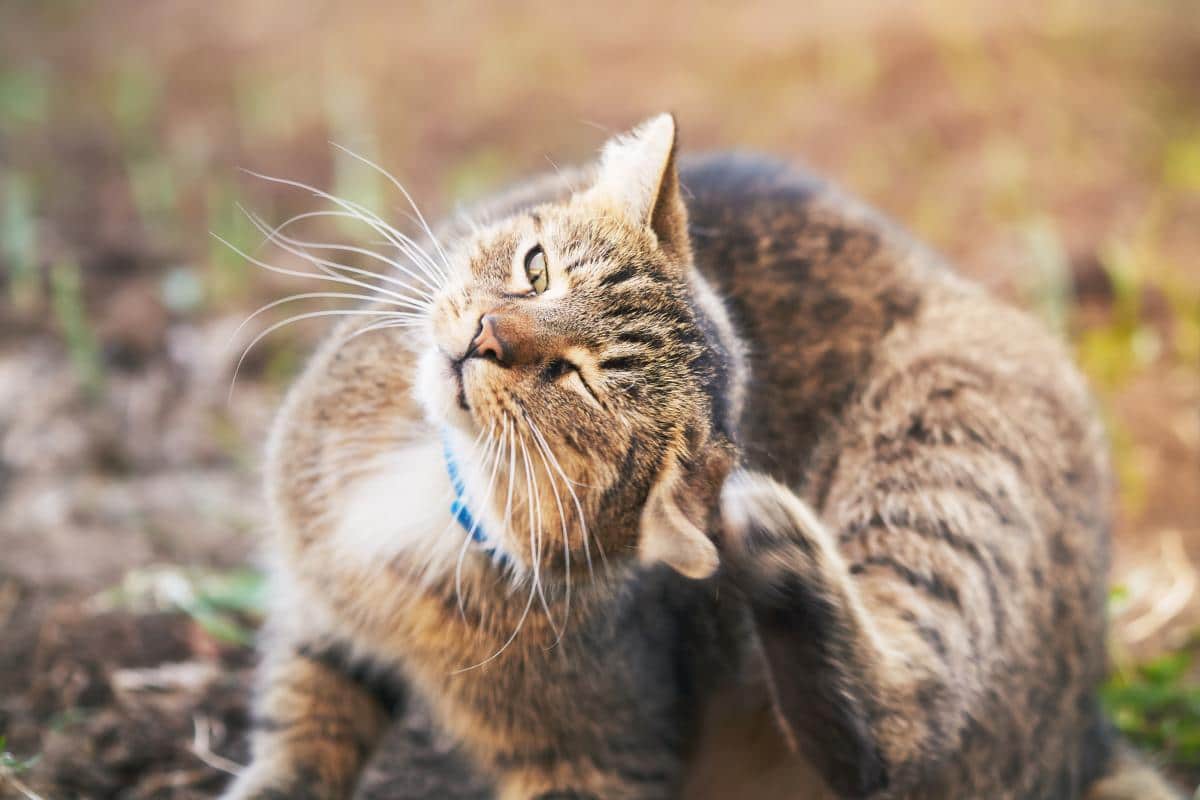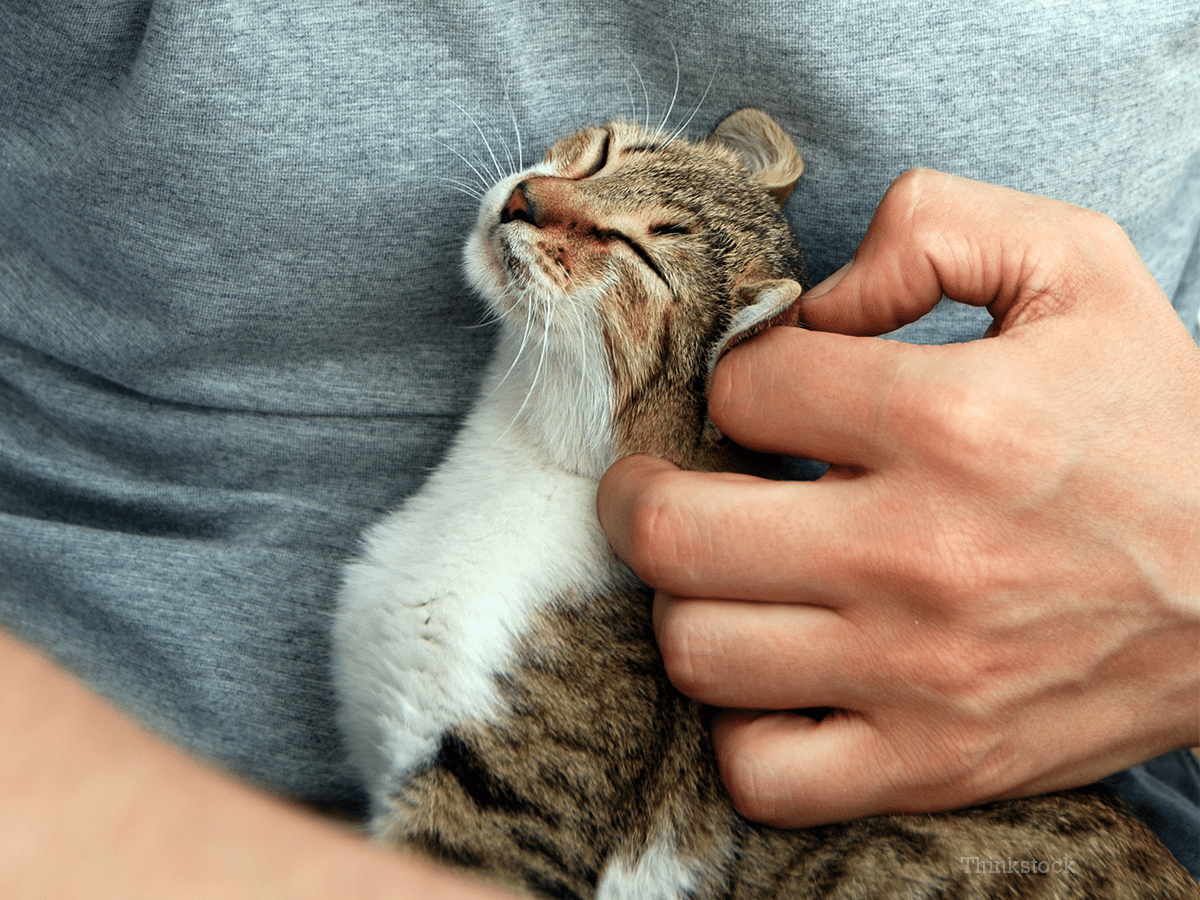
Domestic cat with blue collar scratching head in the garden
We are not going to fool ourselves: cats are unfortunately very vulnerable to flea bites. If they go outside and we have not put anything on them, it is most likely that they will return with the odd unwanted tenant hidden in their fur, especially if it is spring or summer when these parasites are most active. Is there anything we can do to avoid it without using chemicals?
Although today we can find pipettes, necklaces and even pills that protect them, it is also true that they could have important side effects, such as itching, irritation, redness, or even more serious problems such as pulmonary edema, as happened to one of my cats which fortunately was saved. For all this, if we do not trust ourselves, it is best to make a Homemade flea control for cats. How? Very simple: following the steps that we detail below.
¿Cómo hacerlo?

A very effective and easy-to-make homemade flea spray is citrus spray. For it, what you will need will be water, orange peel or lemon, and a sprayer. You got it? If so, it is time to move on to step by step:
- The first thing to do is boil half a liter of water with the skin of the fruit.
- Afterwards, it is left on the fire for a few minutes until the aroma of the fruit is released.
- Finally, remove the skins from the fruit and fill a spray bottle with the resulting water.
When it's cooled down, you can apply it directly on the cat taking care that it does not get into the eyes, ears, nose or the ano-genital area.
How to avoid fleas at home?
It will be useless to protect the cat without cleaning the house well. So let's see what else we can do to say goodbye to fleas forever:
- Vacuuming for the furniture.
- Scrub floors and surfaces with very hot water (If it's boiling, the better)
- Spread diatomaceous earth on cat furniture and surfaces. This soil is actually a very fine white powder composed of fossilized microscopic algae that is used to treat external parasites. You can get it here.
Next we are going to explain some more ways so that you know how to end the fleas in your cats and that they will never be a nuisance for you again.
Vinegar as a homemade flea repellent

Looking for a cheap and natural flea repellent for your cat? If you want to keep fleas off your pet's body and out of your home, but he doesn't like to use chemical-based flea collars and sprays, vinegar is another option to consider. Vinegar is fragrance-free and eco-friendly. It is natural and chemical free, It is safe for pets and children, and soothes your cat's flea bites.
Using vinegar on your pet
Like many pests, fleas hate the smell and taste of vinegar, so they will do their best to avoid it. Use this information to your advantage by making a vinegar-based flea spray to use on your pet.
To make your homemade flea spray, you will need white vinegar or apple cider vinegar. Either is fine, although some people find that their pet prefers the aroma of apple cider vinegar. Just be aware that cats may not tolerate vinegar spray or wipe on them..
Creating flea spray is as simple as diluting the vinegar with water.. Some people recommend mixing equal parts vinegar and water. Others recommend mixing one part vinegar with three parts water. Experiment with both formulas to see which one works best for your cat. The more concentrated formula will have more flea repellent power. If you find that your pet is resistant to odor, start with the most diluted formula and increase once he is used to it.
Before spraying
Before applying your homemade flea repellent, be sure to check your pet for open cuts or sores. Applying vinegar to the bites of broken skin, so be careful not to apply it to any wound because it could sting a lot. Be careful not to spray it in your pet's eyes either. If you want your pet to accept the new form of flea repellent, you don't want him to associate it with any hassle.
To apply
To apply the vinegar solution, use a spray bottle or apply it with a cloth that you have dipped in the solution. Cats may prefer the rubbing method, especially if you have previously used a spray bottle for training and discipline purposes.
If you are using a spray bottle, choose a clean spray bottle that has not previously been used for other chemicals.. Vinegar is an acid and could react with traces of chemicals that remain in a used spray bottle. Mix the vinegar and water in a spray bottle and apply the mixture directly to your pet's fur. Finish working with your hands, let the solution dry; do not wash it.
Do not worry about the smell you will feel at first because once the product dries on the coat the smell will no longer be a problem because it will not smell anymore. After 20 minutes, you can use a flea comb to brush the fleas. Repeat every other day to maintain effectiveness. You can also spray bedding, rugs, and furniture as a preventative measure.
Other home remedies to kill fleas
Next we are going to tell you some home remedies that can also be useful.
Lemon Lavender Witch Hazel Spray
If you prefer the smell of lavender and citrus over vinegar, you can appreciate the ingredients in this homemade flea repellent spray. The effective ingredient in the spray is witch hazel, a natural astringent that tastes bitter. In addition to repelling fleas, witch hazel is also said to help calm inflammation caused by flea bites. However, you may want to test a small amount of this spray on your cat's skin before using it fully, as some animals are allergic to lavender (for allergies, you can use thyme).
This is what you will need:
- Small pot
- A little bottle to spray
- Small funnel
- Large lemon, sliced
- 1 bunch fresh lavender, or 1 tablespoon dried (DO NOT use essential oils)
- 2 cups of water
- 2 tablespoons non-alcoholic witch hazel
To do this you will have to follow the following steps:
- Place all of your ingredients in the pot, except for the witch hazel.
- Boil over low heat. Heat the pot over medium-medium-high heat and simmer for about 30 minutes, or until you see the water start to turn a light lavender purple.
- Remove from heat and let cool. Your home will smell AMAZING!
- Pressure. After your repellent has cooled to room temperature (or at least cold enough not to melt your bottle), pour your repellent through a fine-mesh strainer. You can throw the leftover lavender and lemon in the trash, or better yet, throw it in your compost.
- Shake the product well inside the spray can so that it mixes well and use it on your pet's fur. Remember not to spray on any wound, neither the eyes, nor the nose, nor the mouth nor in the genital area of the animal.
As you see, there are quite a few home remedies that you can drop your own flea repellent to use on your cat instead of using chemicals. If despite the use of these home remedies you realize that your cat still has fleas and that it is increasingly annoying or that this is becoming a problem, then the best thing you can do is go to the vet.
The veterinarian will be able to assess the severity of the flea infestation and thus, once he assesses the severity, he will be able to recommend one type of treatment or another. Fleas are very annoying and the worst thing is that in addition to bothering the animals that suffer from them, They can spread to people, stay at home, and become a big problem.

I have a lot of respect for this page because it gives good advice but this article is an aberration. Because your cat suffers an adverse effect to a drug, you should not sow doubt about drugs that are safe and effective, quite the contrary to the "remedies" that you propose, which are certainly not effective (at most they will repel a flea that, when the effect of the aroma disappears, it can be raised again) or safe, since they can at least damage the skin.
I hope you publish my comment so that at least this is recorded. Due to an adverse effect, you cannot demonize drugs that millions of animals use daily, protecting them from external and internal parasites.
At the very least, you should clarify at the beginning of the article that you do not recommend leaving antiparasitics aside and that you always consult your vet. Not at the end. And then, if they want, they do the remedies that you propose, which are NOT antiparasitic. Proposing that to cats that go outside seems irresponsible to me.